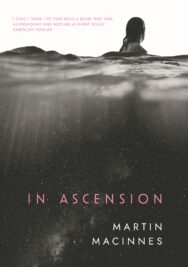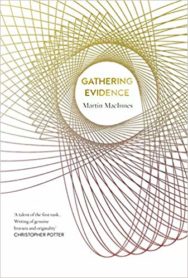Patrick Jamieson Reviews
‘In Ascension is unmistakably a Martin MacInnes novel, who with Infinite Ground (2016) and Gathering Evidence (2020) has already established himself as a unique and formidable voice in the UK literary scene.’
Patrick Jamieson enjoys Martin MacInnes wrestling with issues global and intimate in his latest novel In Ascension.
In Ascension
By Martin MacInnes
Published by Atlantic
Beneath the dressings of form and style, most works of art are concerned with the same basic question: What makes us who we are? The ways of approaching this question are numerous. Modernists turned inward, Naturalists to our environments, while authors of some of the greatest science-fiction sought answers far beyond the reaches of everyday life. In this sense, In Ascension, the latest book by Inverness author Martin MacInnes, is not remarkable. What is remarkable is that it does not assume a single explanation of ‘I’ that is psychological, environmental, or evolutionary, but seeks the answer in all these places at once. This is science-fiction, but not as we know it.
Typically, it all begins with a birth. As a child, Leigh Hasenboch grows up at the water’s edge in Rotterdam surrounded by violence. The violence of the city’s architecture – tower blocks built up following its destruction in World War Two – the violence of ‘growth itself’, and the volatile moods of her depressed father. Poorly protected by her mother and sister, for young Leigh the sea becomes a haven, a place of contact and connection, submerging herself in the ‘teeming immensity’ of the water near their home. Fascinated by the origins of life, she immerses herself in the world of microorganisms, and at first opportunity escapes her fractured family life to study marine biology at the local university.
The stages of Leigh’s career thus structure the five parts of this unforgettable novel. First, she joins a submarine research team in the Caribbean, where the discovery of an inexplicably deep and undocumented Atlantic trench seems unerringly linked to an advancement in propulsion technology which suddenly makes interstellar travel a possibility. Questions are asked but little is given in the way of answers. Her involvement in the trench then affords her a position at a covert space agency based in the Mojave Desert, and later a place on an unprecedented mission to the fringes of our solar system in response to what appears to be alien contact. Despite the grand outward trajectories of these journeys, they continually pull Leigh back to Rotterdam and her past:
‘Maybe, what I thought was an objective and personal interest in the origin and development of cellular life was in fact something smaller, an attempt to flee my own history but also an acceptably disguised way of exploring it. Maybe, rather than investigating the origins of life, I was merely and regrettably pursuing my own individual history.’
For this is where the novel’s real interest lies. Not in the hard science of interstellar travel or the answer to earth’s origins – though there is enough high concept and 2001-esque eeriness in their voyage to keep the most ardent sci-fi fan happy – but what the pursuit of such things reveals about us as individuals. Discoveries made at both the trench and outer reaches of the solar system suggest a convergence to time, endings fold into beginnings, and throughout the novel the distinction between past and present becomes blurred. If this sounds ambitious it is because it is, and MacInnes marries these personal and conceptual themes through a sophisticated web of imagery. Water is the novel’s prime symbol: that which connects human to planet, future to past. Viewing the expanse of the inner solar system from its fringes, Leigh notes how it appeared ‘like the juvenile stage of an aquatic life form’. Water is where life came from in its earliest microorganisms, but it is also the site of its impending demise – it is no coincidence MacInnes sets the novel in a city so at risk of rising sea levels. For Leigh, too, to descend into water means to descend into herself:
‘As the water continued to pull me in, I was drawn, equally involuntarily, to my past. I returned to the ocean, as I returned to my childhood in Rotterdam.’
Elsewhere Leigh recalls how her mother Fenna told her, aged thirteen, of the salmon, and how it swims upstream to return home and give birth to its young. In her struggle forwards to find answers to the past, Leigh too pulls against the current of time. Whether or not she will find what she is looking for – or if she will make her way home – is unclear, but the signs do not look good. A vague spectre of absence can be felt from the very beginning. Towards the end, as they leave the solar system, Leigh describes their feeling of existential dread as ‘earth-loss’, and it immediately becomes clear that this is what we have been feeling throughout the previous 500 pages – a latent ‘earth-loss’. This is not a novel about climate change, but its presence can be felt on the fringes of every page, and I can hardly recall a recent novel that has better emphasised the deep need to preserve our planet.
In Ascension is unmistakably a Martin MacInnes novel, who with Infinite Ground (2016) and Gathering Evidence (2020) has already established himself as a unique and formidable voice in the UK literary scene. Like those novels, it deconstructs a familiar genre in ways that continually surprise, blending high concept with intimate character study. There is also a chaotic quality, not in its pacing – which is intimate and measured – but in its prose. Sentences occasionally extend out with a feverish feel. It makes sense that promotional material sent out with the review copy states that MacInnes wrote the novel entirely by hand. There is a slight unevenness to the book’s sections, too, with the concluding part struggling to match the strength of those previous. Such issues, however, only remind us that the author is human – an important reminder, it should be said, in a book so deeply concerned with our connection to the world around us.
In Ascension by Martin MacInnes is published by Atlantic, priced £17.99.
ALSO IN THIS ISSUE

 In Ascension
In Ascension
‘In Ascension is unmistakably a Martin MacInnes novel, who with Infinite Ground (2016) and Gathering …















